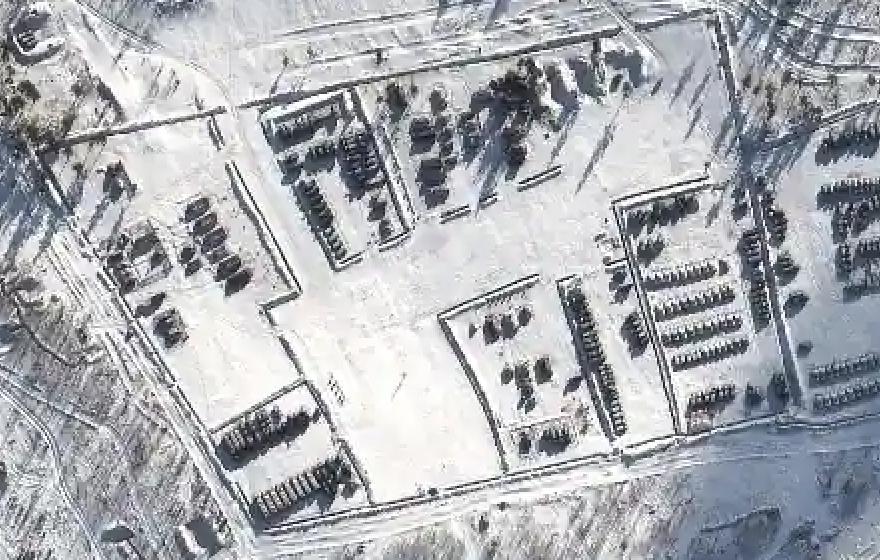Eight days ago, the White House told us a Russian attack on Ukraine “may be imminent.” Since then, the Russians have moved more troops in position to execute a massive invasion. Secretary Blinken has ordered the withdrawal of embassy personnel in Kyiv. And reports have surfaced that President Biden is considering sending troops to neighboring countries. None of these actions has made any difference. Vladimir Putin shows no sign of backing down. Rather than considering the consequences of an invasion, he is plotting a coup in Kyiv to install a puppet leader who will do his bidding.
The odds of a Russian invasion of Ukraine are now close to 100 percent.
A war in Ukraine is unwelcome news for everyone except perhaps Putin. Looking at the situation from a U.S. perspective, it is not too farfetched to say the crisis couldn’t have come at a worse time. The Biden administration doesn’t need another foreign policy crisis, especially when policy experts still worry about a Chinese invasion of Taiwan after the Olympics end. And the war would come when the U.S. is politically divided, is still dealing with the pandemic, and is led by an unpopular president.
The Biden administration and our European allies are figuring out what to do if Putin moves forward. They are also evaluating whether the threat of sanctions will be enough to convince Putin that the invasion would be a mistake. Don’t hold your breath. Does anyone remember a time when Putin was open to reason or admitted a mistake? I don’t. That makes the situation in Ukraine particularly challenging for the U.S. and for the Biden administration. Most Americans know little about the country or its people. Any decision by President Biden to intervene in this dispute is bound to be unpopular.
How bad is the situation for Biden? The 20-year war in Afghanistan just ended with an ignominious American withdrawal. Can you tell me what countries, excepting Russia, border Ukraine without resorting to a Google search? And do you speak Ukrainian? How do you say, “Please save us, America” in Ukrainian?
So far, the U.S. has the support of our European allies. That’s reassuring, but the allies are waiting to see what Biden will do, and it’s not clear he knows. Will our allies stick with us if the bombs start falling? And, if we got involved in a war, what would he end game be?
Current discussions include imposing sanctions now, before the invasion takes place. Would that deter Putin? Or would Putin be more inclined to proceed with the invasion if Russia has already been punished? And will the stationing of troops in neighboring countries just further provoke Putin? I’m not sure anyone knows the answers.
While the question of whether Putin will respond to sanctions or the threat of sanctions is important, we are unlikely to know the answer until Putin withdraws his forces. Because some suggest that an American-led response to the invasion would benefit Putin domestically by convincing Russians that they need a strong leader to protect them, Putin may not want to end the crisis. Then there is the more puzzling question of whether Putin has already concluded that Biden’s hands are tied because the American public won’t support any response beyond economic sanctions.
So, does that mean that a Russian annexation of part or all of Ukraine is inevitable? My guess would be yes. But asking me what that means to the U.S. is a harder question to answer. I’m not sure the war would tank the U.S. economy. Nor would a war not involving U.S. troops hurt Biden’s popularity. How much lower can Biden’s popularity go?
All the above makes the Ukraine crisis a dilemma for the U.S. And the only way out of the dilemma is for President Biden and his team to figure out what America’s interests are and what we need to do to protect them. Once he figures out those interests, he will need to convince the American public to follow his leadership. That will be a tall order.
As this piece is being written, reports are emerging that Biden is contemplating decisive action. He doesn’t want a war but, I suspect, he is worried about the long-term consequences of not responding forcefully to a Russian invasion. If the U.S. allows Putin to annex Ukraine, what message does that send to China as it seeks to “reunify” Taiwan. Remember Neville Chamberlin? My guess is that Biden is thinking about him a lot these days.
J.E. Dean is a retired attorney and public affairs consultant writing on politics, government, birds, and other subjects.



jan bohn says
As a completely ‘uneducated’ e.g. only reading/hearing from the ‘media’ about America in the Ukrainian/Russian conflict, my take is if America does not support Ukraine we are abdicating our position as ‘leaders of the free world’. If we wish to support those who wish to become/continue to be democratic societies we must support countries like Ukraine.
John Dean says
Thank you for your comment–I completely agree.
I have been pleased that since I wrote the piece, Pres. Biden seems to be gearing up to take stronger measures to prevent or respond to an invasion.
Thanks for reading the piece.
RC SHAFER says
Ordering American soldiers to protect the Ukrainian border on the other side of the globe makes absolutely no sense in light of the fact that the Biden Administration is woefully unwilling to station American troops to protect our own national border along the Rio Grande. Undocumented illegal aliens and human trafficking notwithstanding, fentanyl has murdered 3 times more American citizens than COVID during the past year. We would be wise to mind or own business at home before allowing our Deep State warmongers to involve us into still another zombie war like the disastrous one we just ignominiously concluded in Afghanistan.